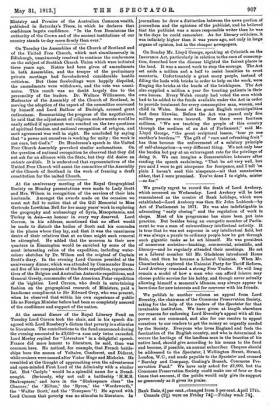On Sunday Mr. Lloyd George, speaking at Criccieth on the
Insurance Act, particularly in relation to the cure of consump- tion, described how the disease blighted the fairest places in the land. It was a sacred work to stop the scourge. The Act set aside a million and a half to assist localities to erect sanatoria. Unfortunately a great many people, instead of filling the hods with bricks in order to help on the work, were flinging the bricks at the heads of the bricklayers. The Act also supplied a million a year for treating patients in their own homes. Every Welsh county had voted the sum which had to be added to the funds available under the Act in order to provide treatment for every consumptive man, woman, and child in Wales. Some of the great English municipalities had done likewise. Before the Act was passed only five million persons were insured. Now there were fourteen millions. " We are teaching the people of this country through the medium of an Act of Parliament," said Mr. Lloyd George, " the great scriptural lesson, ' bear ye one another's burdens.'" The gift of "rare and refreshing fruit" has thus become the enforcement of a salutary principle of self-abnegation—a very different thing. We not only bear the burden but pay at an extravagant rate for the privilege of doing it. We can imagine a Somersetshire labourer after reading the speech exclaiming, "That be aH very well, but you said I were to get ninepence for fourpence, and I tell 'ee plain I haven't seed thic ninepence—nit that sanatorium either, that I were promised. You've done I to rights, mister —so fur."


















































 Previous page
Previous page